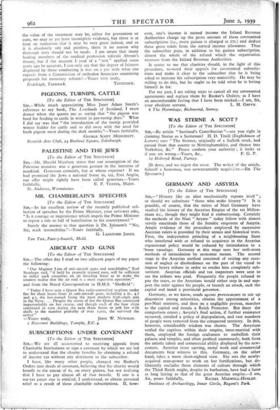GERMANY AND ASSYRIA
[To the Editor of THE SPECTATOR] SIR,—" History like an idiot mechanically repeats itself " ; or should we substitute " those who make history "? It is possible, of course, that the rulers of Nazi. Germany have studied the history of the Assyrian Empire of the 1st Millen- nium B.C., though they might find it embarrassing. Certainly the methods of the Nazi " Aryans " today follow with almost servile exactitude those of the Semitic emperors of Assyria: Ample evidence of the procedure employed by successive Assyrian rulers is provided by their annals and historical texts. First, the independent princling of a neighbouring State who interfered with or refused to acquiesce in the Assyrian expansional policy would be reduced by intimidation to a loose vassalage. Germany at this stage uses her well-worn methods of intimidation by economic means. The second stage in the Assyrian method consisted of seizing any occa- sion of neglect or disobedience on the part of the vassal to impose heavy tribute in order to render him completely sub- servient. Assyrian officials and tax inspectors were sent to see the tribute was paid. Frequently the people refused to pay the taxes, so the Assyrians would either step in and sup- port the ruler against his people, or launch an attack, sack the capital and instal a provincial governor.
Germany, as we know, sends agents provocateurs to stir up discontent among minorities, obtains the appointment of a pro-Nazi ministry, and then on a negligible pretext, marches to the capital and instals a Reich Protector. But there the comparison ceases ; Assyria's final action, if further resistance occurred, entailed a policy of depopulation, and vast numbers of people were removed from the conquered territory. In this, however, considerable wisdom was shown. The Assyrians settled the captives within their empire, inter-married with them, employed the foreign craftsmen to embellish their palaces and temples, and often profited enormously, both from the artistic talent and commercial ability displayed by the new- comers. Assyrian ivory carving, metal work and commercial documents bear witness to this. Germany, on the other hand, takes a more short-sighted view. She sets the newly- acquired man-power to work on her fortifications, but de- liberately excludes those elements of culture through which the Third Reich might, despite its barbarism, have had a fame as long lasting as that of the great Assyrian empire.—I am,










































 Previous page
Previous page